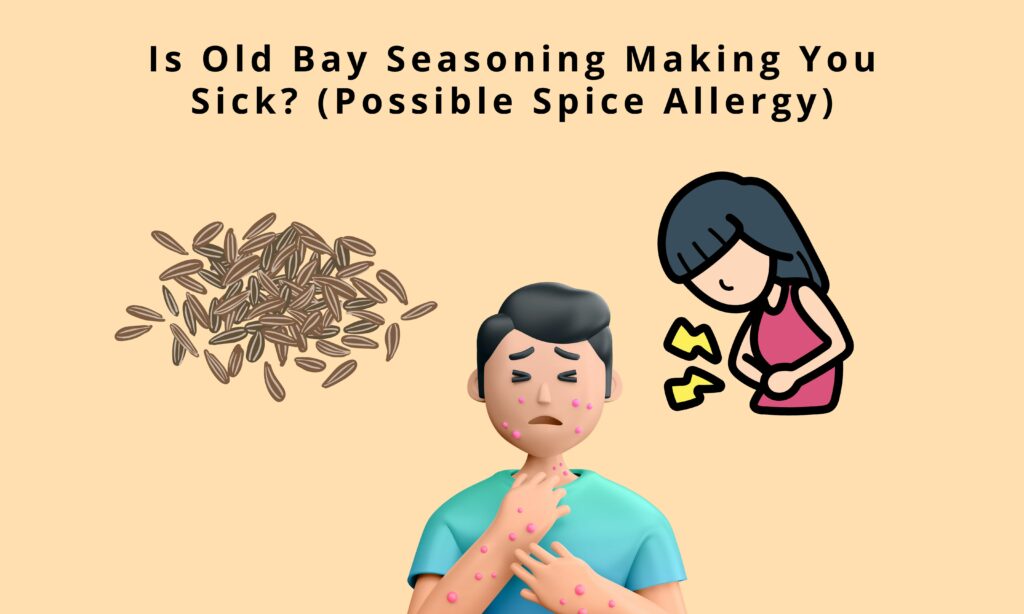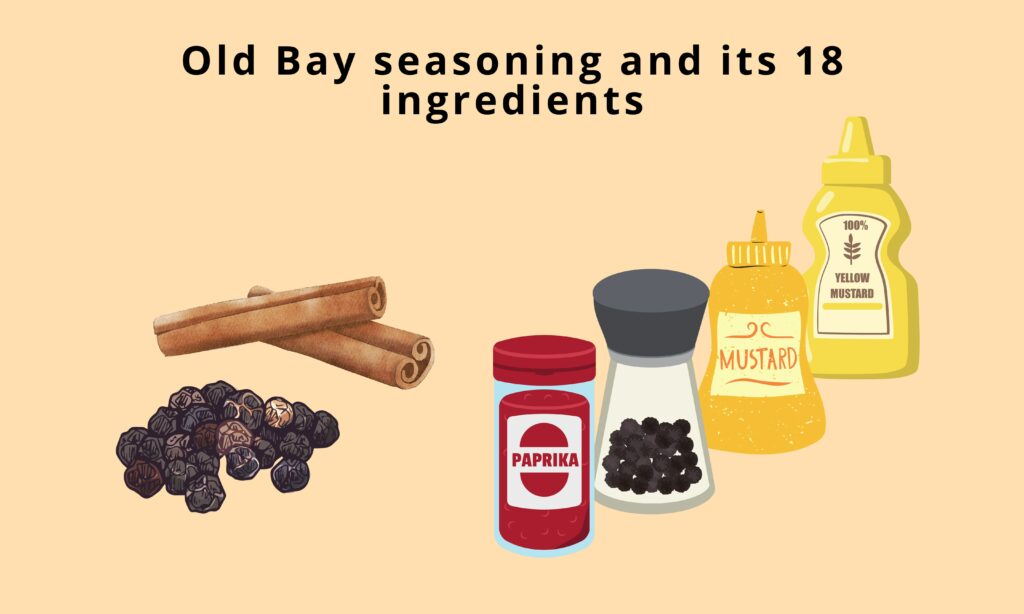
If you’ve ever experienced symptoms of an allergic reaction after consuming Old Bay Seasoning, you may be wondering if the spice is making you sick. While spice allergies are relatively uncommon, they can be serious and even life-threatening in some cases. Here are some possible causes of an allergic reaction to Old Bay Seasoning.
- One possible cause of an allergic reaction to Old Bay Seasoning is a sensitivity or allergy to one or more of the spices in the blend. Old Bay Seasoning typically contains a mix of spices such as celery salt, paprika, and black pepper. If you have an allergy or sensitivity to any of these ingredients, consuming Old Bay Seasoning can trigger symptoms such as hives, itching, gastrointestinal distress, and difficulty breathing.
- Another possible cause of an allergic reaction to Old Bay Seasoning is cross-contamination with other allergens. Old Bay Seasoning is often used in restaurant kitchens and other food service settings, where it may come into contact with other allergens such as nuts, shellfish, or gluten. If you have a known allergy to any of these foods, consuming Old Bay Seasoning that has been contaminated can trigger an allergic reaction.
If you suspect that Old Bay Seasoning makes you sick, it’s essential to seek medical attention to confirm the diagnosis and receive appropriate treatment. Your doctor may recommend allergy testing to determine the specific allergen causing your symptoms. Treatment for a spice allergy may include avoiding the allergen, taking antihistamines or other medications to relieve symptoms, and carrying an epinephrine auto-injector in case of a severe reaction.
Preventing a reaction to Old Bay Seasoning is key to avoiding symptoms and staying healthy. If you have a known allergy or sensitivity to any of the spices in the blend, avoid consuming Old Bay Seasoning in any form. Reading labels carefully and asking questions about ingredients in restaurant dishes can also help prevent accidental exposure to the allergen.
In conclusion, if you suspect that Old Bay Seasoning makes you sick, it’s essential to take the allergy seriously and seek medical attention to confirm the diagnosis and receive appropriate treatment. By being proactive and working with your doctor, you can manage your spice allergy and stay healthy. Remember to avoid consuming Old Bay Seasoning or any other foods that contain the allergen and always carry an epinephrine auto-injector in case of a severe reaction.
Old Bay seasoning and its 18 ingredients

Old Bay Seasoning is a popular spice blend that’s commonly used in seafood dishes, as well as other types of cuisine. The blend was created in the 1940s by a German immigrant named Gustav Brunn, who wanted to create a versatile seasoning that could be used in a variety of dishes. Old Bay Seasoning contains 18 different ingredients, and for some people, the blend can trigger symptoms of a spice allergy or sensitivity that can make them feel sick.
Some of the ingredients in Old Bay Seasoning that can cause an allergic reaction include celery salt, black pepper, and paprika. Celery salt is a common seasoning that’s made from ground celery seeds and salt. While celery salt is generally considered safe, some people can have an allergy or sensitivity to celery, which can cause symptoms such as hives, itching, and gastrointestinal distress. Black pepper and paprika are also common spices that can trigger an allergic reaction in some people.
Other ingredients in Old Bay Seasoning that can cause a reaction include mustard, cinnamon, and allspice. Mustard is a common allergen that can cause symptoms such as hives, itching, and difficulty breathing. Cinnamon and allspice are less common allergens, but they can still trigger a reaction in some people.
If you have a known allergy or sensitivity to any of the ingredients in Old Bay Seasoning, it’s essential to avoid consuming the blend in any form. Reading labels carefully and asking questions about ingredients in restaurant dishes can also help prevent accidental exposure to the allergen. If you do accidentally consume Old Bay Seasoning and experience symptoms of an allergic reaction, seek medical attention immediately.
In conclusion, while Old Bay Seasoning is a popular spice blend that can add flavor to a variety of dishes, it can also trigger symptoms of a spice allergy or sensitivity in some people. The blend contains 18 different ingredients, including common allergens such as celery salt and mustard. If you suspect that Old Bay Seasoning makes you sick, it’s essential to take the allergy seriously and seek medical attention to confirm the diagnosis and receive appropriate treatment. By being proactive and working with your doctor, you can manage your spice allergy and stay healthy.
Old bay seasoning and allergens
Old Bay Seasoning is a popular spice blend that is widely used in seafood dishes and other types of cuisine. The blend is made up of 18 different ingredients, some of which can trigger an allergic reaction in certain people. If you have an allergy to any of the ingredients in Old Bay Seasoning, consuming it can make you feel sick.
- Salt: One of the primary allergens in Old Bay Seasoning is celery salt. Celery is a common food allergen that can cause a range of symptoms, including hives, itching, and difficulty breathing. Some people may also have a sensitivity to celery, which can cause gastrointestinal distress and other symptoms.
- Mustard: Another common allergen in Old Bay Seasoning is mustard. Mustard is a member of the cruciferous family of vegetables and is commonly used as a condiment and seasoning. For people with a mustard allergy, consuming Old Bay Seasoning can trigger symptoms such as hives, swelling, and difficulty breathing.
Other potential allergens in Old Bay Seasoning include cinnamon, allspice, and paprika. While these spices are not as commonly associated with allergies as celery and mustard, they can still trigger a reaction in some people. Symptoms of an allergic reaction to these spices can include hives, itching, and difficulty breathing.
If you suspect that Old Bay Seasoning makes you sick, it’s essential to seek medical attention to confirm the diagnosis and receive appropriate treatment. Your doctor may recommend allergy testing to determine the specific allergen causing your symptoms. Treatment for a spice allergy may include avoiding the allergen, taking antihistamines or other medications to relieve symptoms, and carrying an epinephrine auto-injector in case of a severe reaction.
In conclusion, Old Bay Seasoning can be a delicious addition to many dishes, but it can also contain allergens that can make some people sick. Celery salt and mustard are two common allergens in the blend, but other ingredients such as cinnamon and allspice can also trigger a reaction in some people. If you suspect that Old Bay Seasoning makes you sick, it’s essential to take the allergy seriously and seek medical attention to confirm the diagnosis and receive appropriate treatment. By being proactive and working with your doctor, you can manage your spice allergy and stay healthy.
Am I allergic to spices?
If you experience symptoms such as hives, itching, or gastrointestinal distress after consuming spices like Old Bay Seasoning, you may wonder if you have a spice allergy. While spice allergies are relatively uncommon, they can cause significant discomfort and may require medical attention. Here are some signs that you may be allergic to spices:
- Consistent symptoms after consuming spices: If you experience symptoms every time you consume a particular spice, such as Old Bay Seasoning, it’s possible that you have a spice allergy. Symptoms may include hives, itching, gastrointestinal distress, and difficulty breathing.
- Similar symptoms with different spices: If you experience similar symptoms after consuming different types of spices, it’s also possible that you have a spice allergy. Many spices contain similar compounds that can trigger an allergic reaction in susceptible individuals.
- Family history of allergies: If you have a family history of allergies, you may be more likely to develop a spice allergy. Allergies often run in families, and individuals with one type of allergy may be more prone to developing others.
If you suspect that you have a spice allergy, it’s essential to seek medical attention to confirm the diagnosis and receive appropriate treatment. Your doctor may recommend allergy testing to determine the specific allergen causing your symptoms. Treatment for a spice allergy may include avoiding the allergen, taking antihistamines or other medications to relieve symptoms, and carrying an epinephrine auto-injector in case of a severe reaction.
In conclusion, if you experience symptoms such as hives, itching, or gastrointestinal distress after consuming spices like Old Bay Seasoning, it’s possible that you have a spice allergy. Other signs of a spice allergy may include consistent symptoms after consuming a particular spice, similar symptoms with different spices, and a family history of allergies. If you suspect that you have a spice allergy, it’s essential to seek medical attention to confirm the diagnosis and receive appropriate treatment. By working with your doctor, you can manage your spice allergy and avoid potentially serious complications.
Most common spices for allergy
Spices are an essential part of many dishes, but they can also cause allergies in some people. While spice allergies are relatively uncommon, they can be a significant source of discomfort for those affected. Here are some of the most common spices that can cause allergies:
- Mustard: Mustard is a member of the cruciferous family of vegetables and is commonly used as a condiment and seasoning. For people with a mustard allergy, consuming foods that contain mustard can trigger symptoms such as hives, swelling, and difficulty breathing.
- Cumin: Cumin is a spice commonly used in Middle Eastern and Indian cuisine. It is also a common cause of spice allergies and can cause symptoms such as hives, itching, and gastrointestinal distress.
- Coriander: Coriander is a spice made from the seeds of the coriander plant. It is commonly used in Indian, Middle Eastern, and Mediterranean cuisine. For some people, consuming coriander can trigger an allergic reaction, with symptoms such as hives, swelling, and difficulty breathing.
- Paprika: Paprika is a spice made from dried and ground bell peppers. It is commonly used in Hungarian, Spanish, and Mexican cuisine. Paprika can cause symptoms such as hives, itching, and difficulty breathing in people with a spice allergy.
- Garlic: Garlic is a common ingredient in many dishes, and it is also a common allergen. People with a garlic allergy may experience symptoms such as hives, itching, and gastrointestinal distress.
- Ginger: Ginger is a spice commonly used in Asian cuisine and can also be found in many health supplements. For some people, consuming ginger can cause symptoms such as hives, swelling, and difficulty breathing.
- Allspice: Allspice is a spice made from the dried berries of the allspice tree. It is commonly used in Caribbean, Middle Eastern, and Latin American cuisine. Allspice can cause symptoms such as hives, itching, and difficulty breathing in people with a spice allergy.
In conclusion, while spice allergies are relatively uncommon, they can be a significant source of discomfort for those affected. Some of the most common spices that can cause allergies include mustard, cumin, coriander, paprika, garlic, ginger, and allspice. If you suspect that you have a spice allergy, it’s essential to seek medical attention to confirm the diagnosis and receive appropriate treatment. By working with your doctor, you can manage your spice allergy and avoid potentially serious complications.
When to see the doctor

If you experience symptoms after consuming Old Bay seasoning or any other spice, it’s important to know when to seek medical attention. Here are some signs that it may be time to see a doctor:
- Severe symptoms: If you experience severe symptoms such as difficulty breathing, swelling of the face or throat, or chest pain, seek medical attention immediately. These symptoms could indicate a severe allergic reaction called anaphylaxis, which requires urgent treatment.
- Symptoms that persist: If you experience symptoms that persist for several hours or days, even after you have stopped consuming the spice, it’s important to see a doctor. This could indicate an allergic reaction that requires medical treatment.
- History of allergies: If you have a history of allergies, especially to spices or other foods, it’s important to see a doctor if you experience any symptoms after consuming Old Bay seasoning or any other spice. You may be more susceptible to developing allergies to other spices in the future.
- Unknown allergy: If you experience symptoms after consuming Old Bay seasoning or any other spice for the first time, it’s important to see a doctor to confirm the diagnosis. Some symptoms may be caused by other factors, such as food poisoning or a viral illness, so it’s important to rule out other causes.
- Allergic reactions to other substances: If you have a history of allergic reactions to other substances such as medications or insect stings, it’s important to see a doctor if you experience symptoms after consuming Old Bay seasoning or any other spice. You may be more likely to develop allergies to other substances in the future.
In conclusion, if you experience symptoms after consuming Old Bay seasoning or any other spice, it’s important to know when to seek medical attention. If you experience severe symptoms, symptoms that persist, have a history of allergies, experience symptoms after consuming a spice for the first time, or have a history of allergic reactions to other substances, it’s important to see a doctor to confirm the diagnosis and receive appropriate treatment. By working with your doctor, you can manage your spice allergy and avoid potentially serious complications.
FAQs
If you suspect that Old Bay seasoning is making you sick, you may have some questions. Here are some frequently asked questions about Old Bay seasoning allergies:
- What are the symptoms of an Old Bay seasoning allergy? Symptoms of an Old Bay seasoning allergy can vary but may include hives, itching, swelling, difficulty breathing, and stomach pain.
- Is it possible to be allergic to Old Bay seasoning but not other spices? Yes, it’s possible to be allergic to Old Bay seasoning but not other spices. Each person’s immune system is unique, and some people may be more sensitive to certain spices than others.
- How can I confirm whether I’m allergic to Old Bay seasoning? If you suspect that you may be allergic to Old Bay seasoning, it’s important to see a doctor. Your doctor may recommend skin testing or blood testing to confirm the diagnosis.
- Can I still eat other spices if I’m allergic to Old Bay seasoning? If you’re allergic to Old Bay seasoning, your doctor may recommend that you avoid all spices, especially those that are related to Old Bay seasoning, such as celery seed or paprika.
- How can I avoid Old Bay seasoning if I have a spice allergy? Read food labels carefully and avoid foods that contain Old Bay seasoning or other spices that you’re allergic to. It’s also a good idea to avoid eating at restaurants or consuming processed foods, which may contain spices that you’re allergic to.
- Can an Old Bay seasoning allergy be life-threatening? In rare cases, an Old Bay seasoning allergy can cause a severe allergic reaction called anaphylaxis, which can be life-threatening. It’s important to seek medical attention immediately if you experience symptoms of anaphylaxis, such as difficulty breathing or swelling of the face or throat.
In conclusion, if you suspect that Old Bay seasoning is making you sick, it’s important to see a doctor to confirm the diagnosis and receive appropriate treatment. You may have some questions about Old Bay seasoning allergies, but with the help of your doctor, you can manage your allergy and avoid potentially serious complications.
To summarise
In conclusion, if you suspect that Old Bay seasoning makes you sick, it’s important to pay attention to your symptoms and seek medical attention if necessary. Old Bay seasoning is a blend of 18 different spices, and some people may be allergic to one or more of these ingredients. Common symptoms of an Old Bay seasoning allergy include hives, itching, swelling, difficulty breathing, and stomach pain.
If you suspect that you have an Old Bay seasoning allergy, it’s important to see a doctor for confirmation. Your doctor may recommend skin testing or blood testing to determine the cause of your symptoms. Once you have a confirmed diagnosis, your doctor can work with you to develop a plan to manage your allergy.
If you have an Old Bay seasoning allergy, your doctor may recommend that you avoid all spices, especially those that are related to Old Bay seasoning, such as celery seed or paprika. You should also read food labels carefully and avoid processed foods and restaurant meals, which may contain spices that you’re allergic to.
In rare cases, an Old Bay seasoning allergy can cause a severe allergic reaction called anaphylaxis, which can be life-threatening. If you experience symptoms of anaphylaxis, such as difficulty breathing or swelling of the face or throat, seek medical attention immediately.
In summary, if you suspect that Old Bay seasoning makes you sick, don’t ignore your symptoms. Seek medical attention to confirm the diagnosis and receive appropriate treatment. With the help of your doctor, you can manage your allergy and avoid potentially serious complications.